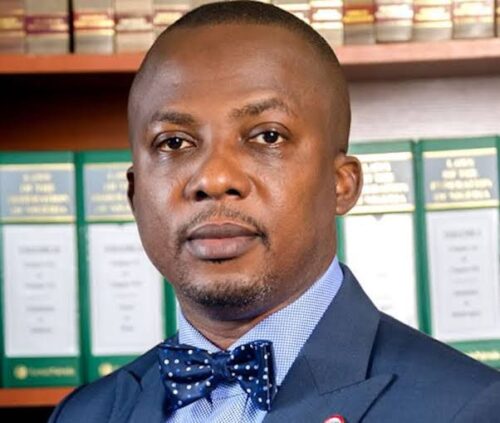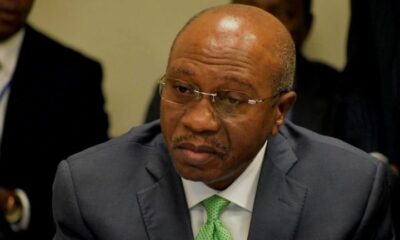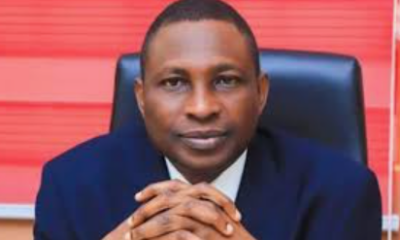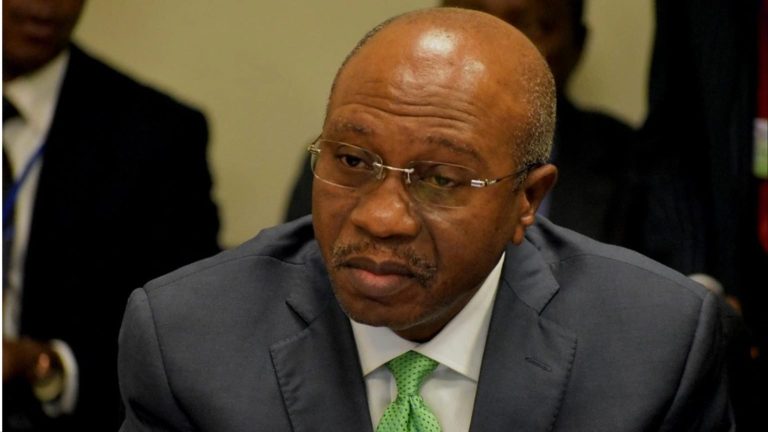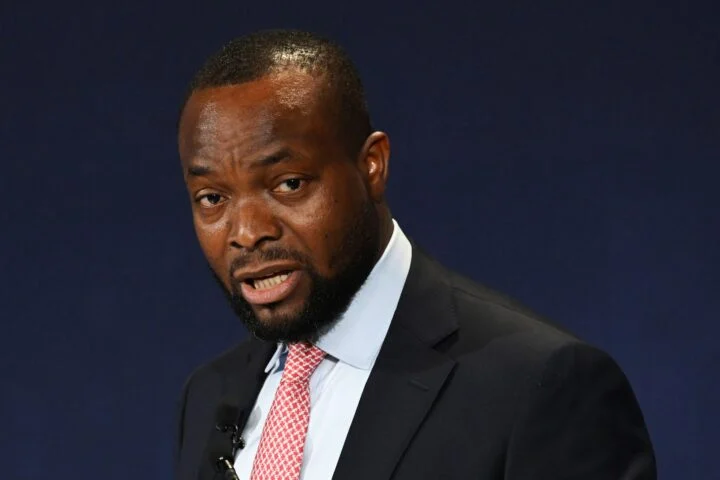Each person is a thread in the tapestry of creation but some people stand outside of the weave directing the thread and painting the pictures that become reality. Tokunbo Wahab, the immediate past Special Adviser on Education to the Governor of Lagos State, Babajide Sanwo-Olu, is one of the rare latter.
Undoubtedly one of the brightest but self-effacing stars in the first term of Sanwo-Olu’s administration, Wahab covets neither paeans nor rhapsodies for his commanding tour de force in the actualisation of Governor Sanwo-Olu’s vision for the rejuvenation of tertiary education as encapsulated under the ingenious T.H.E.M.E.S Agenda. And he is forever quick to counsel folk about his ordinariness while preventing them from dressing him in what he considers spurious cloaks of a ‘messiah,’ or ‘deity’ or ‘tin god.’
Gangling and genial, generous and god-fearing, everybody seems to love the successful lawyer-turned-public servant for his humility, generosity of spirit, and fierce loyalty to the success of Governor Sanwo-Olu.
Beneficiaries of his exceptional humaneness in private and public offices frequently have wonderful stories to share from their encounters with him. However brief or extended the encounter is, Wahab snatches grief or gloom from acquaintances and replaces it with joy and joie de vivre because he sees a relative in everyone. He believes humanity is one large family divided along race, religion, and other bigoted lines and his response to this defies the depths of human failings and pretensions of altruism.
His first emergence on the political circuit in Lagos State was as a governorship aspirant in 2014 in the All Progressives Congress. He was 42 years old with lush, emergent grey beards that accentuated his smouldering, boyish visage.
Apart from fellow lawyers, social collaborators, and a sprinkling of media people, the Epe-born University of Benin graduate was barely known. Yet, he aspired to govern Lagos State! His mantra was – “Think Lagos for a tomorrow that works.” It was an audacious and astonishing move that generated a lot of discourse in the media space. Wahab did not get the ticket but he had already announced himself to those that matter in the political configuration of the state and the party at large.
Fast forward to 2019; Governor Babajide Sanwo-Olu appointed Wahab as his Special Adviser on Education, charging him to steer and supervise his vision for tertiary institutions in Lagos State. Wahab went full gung-ho into the assignment, cutting large swaths through the convolution that is the tertiary education ecosystem while earning his principal accolades from far and near.
Until 2022, Lagos had just one university – the Lagos State University. Yet, statistics from the Joint Admissions and Matriculation Board revealed that in 2020, out of 574,782 candidates that applied to sit the Unified Tertiary Matriculation Examination from the six states in the South-West, Lagos State alone accounted for almost half of the figure at 240,829. LASU couldn’t admit more than 5,000 at a go, yet the applications were very high. It was a ticking time bomb.
Conversely, Wahab said, “Ondo has three (higher institutions) and Ogun has two. Not until recently when Osun and Oyo states went their separate ways on the Ladoke Akintola University of Technology, Ogbomoso, the two also had more than one state-owned university. The implication is that our students from Lagos continue to struggle to gain admission to universities because other states usually introduce classification based on indigeneship.”
With just a tenacity of purpose and a terrier devotion to the belief that Lagos State, with its growing youth population, deserved more than one university, Wahab worked round the clock, consulted extensively, and networked widely to ensure that the state’s bid to get two more universities accredited by the National Universities Commission was achieved.
On February 8, 2022, the NUC, the regulatory body in charge of universities in Nigeria, approved the take-off of the two new specialised universities in Lagos State. While the Adeniran Ogunsanya College of Education and the Michael Otedola College of Primary Education morphed into the Lagos State University of Education; the Lagos State Polytechnic was upgraded to the Lagos State University of Science and Technology.
For Wahab, the approval and eventual take-off of the universities remains a veritable home run, the culmination of many years of hard work, and a fulfilment of one of Governor Sanwo-Olu’s cardinal promises to Lagosians to give the youths more access to affordable and qualitative varsity education.
He did not just help to birth new higher institutions, Wahab is also helping products of the state’s tertiary institutions to adequately prepare for the world of work with the Jobs Initiative Lagos which aims to fill the documented gaps in the current curriculum that is essential in the employment market and enhances the employability of graduates in Lagos.
The programme is a spin-off of the Ready-Set-Work initiative, an employability and entrepreneurship program aimed at preparing final-year students for immediate entry into the workforce as employees and employers of labour by equipping them with the knowledge, soft skills, business tools, and a mindset reorientation to the world of work.
It runs alongside the digital skills campaign, ‘Digital Skills Initiative Lagos’, launched in 2020 during the COVID-19 lockdown to empower young people in the state with digital skills that will invariably position Lagos as the Tech Hub of Africa.
Even more symbolic is the turnaround in LASU, which was infamous for its fractious transition of power. This time, a new vice-chancellor, Prof. Ibiyemi Olatunji-Bello, was appointed in a transparent and seamless, and applause-worthy process.
With the strong backing of Governor Sanwo-Olu, LASU did not join the months-long Academic Staff Union of Universities strike.
More than four decades after it was established, LASU is set to become a residential tertiary institution as the state government, under the Public-Private Partnership has signed a Build, Operate and Transfer agreement with six property developers to construct 8,272 units of hostels in the school’s premises.
Not forgetting that Wahab masterminded the collaboration between LASU and Cornell University, New York, for 16 professional certificate programmes to be run by the two institutions.
Wahab said then that the decision to collaborate with Cornell University rated as one of the leading universities globally, was borne out of the desire to keep and sustain LASU’s pedigree and high academic profile as the second-best university in Nigeria and one of the best 600 in the world.
He added that the establishment of LASU/Cornell University Postgraduate Professional Certificate Programmes was aimed at giving prospective students across the country an opportunity to gain global skills and professional expertise that will not only make them relevant and employable but globally competitive in the 21st Century digital economy.
At the risk of sounding clichéd, Wahab has redefined the tertiary education landscape of Lagos State and inadvertently written his name in gold with his robust catalogue of achievements in the all–important sector.
For Wahab, the dissolution of the Sanwo-Olu administration last Wednesday, May 24, was the end of an impactful era, but for a man who sees the hydraulic lifts on which his public career is being hoisted and the machinery that is steadily and surefootedly wheeling him to the centre stage, May 29, 2023, or the days after, will signal, ceteris paribus, the beginning of an even more impactful era. Take a bow, Toks!
Oyetayo, a Lagos-based media executive, can be reached on social media via @shynewriter

 BIG STORY20 hours ago
BIG STORY20 hours ago
 BIG STORY4 days ago
BIG STORY4 days ago
 BIG STORY3 days ago
BIG STORY3 days ago
 BIG STORY3 days ago
BIG STORY3 days ago
 BIG STORY2 days ago
BIG STORY2 days ago
 BIG STORY2 days ago
BIG STORY2 days ago
 BIG STORY3 days ago
BIG STORY3 days ago
 BIG STORY3 days ago
BIG STORY3 days ago




